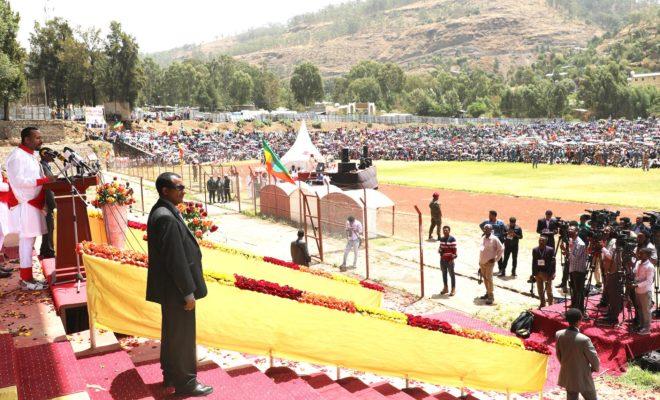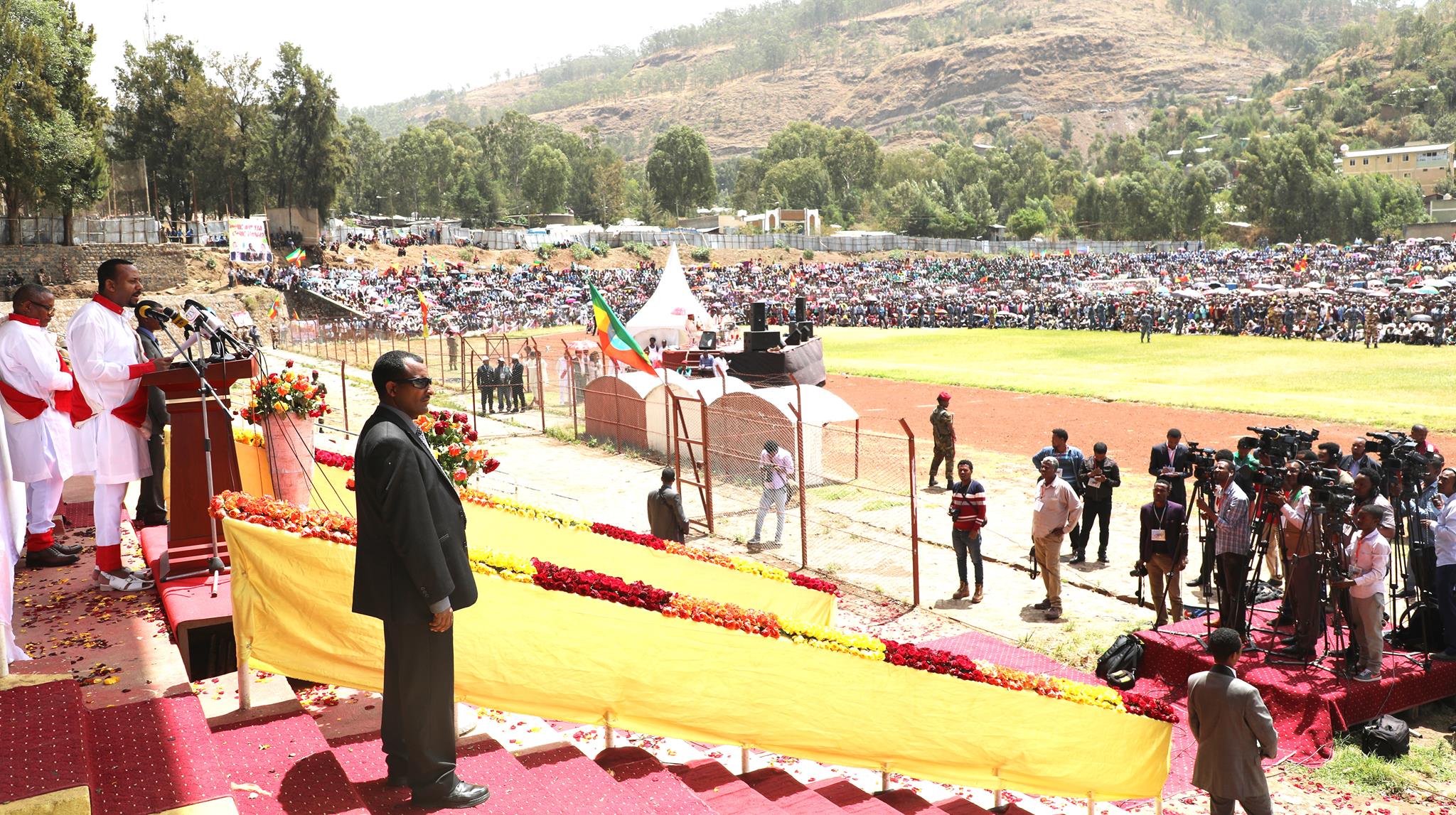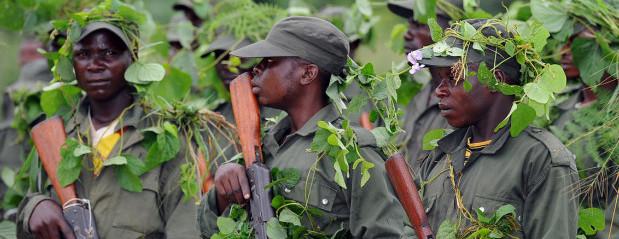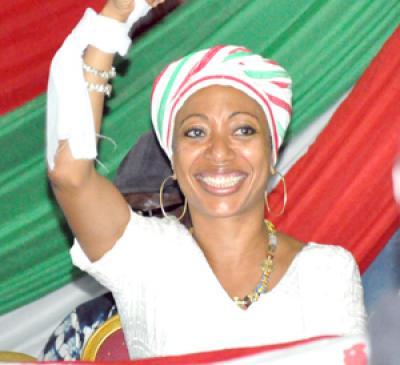Ethiopia: Rising ethnic violence undermines Abiy’s reform agenda

Ethiopia’s unique federal arrangement has given ethnic politics, and violence, the foundation to flourish. What can the PM do to address this?

Ethiopia’s Prime Minister Abiy Ahmed gives a speech in April 2018. Credit: Abiy Ahmed.
Ethiopia’s Prime Minister Abiy Ahmed’s first five months in office have brought enormous change to the country. Thanks to astounding short-term gains, Ethiopians at home and abroad are feeling hopeful. But all is not well. Ethnic violence and tensions are on the rise.
Such conflicts are not new, but the levels of violence being witnessed today among some of Ethiopia’s more than 80 ethnic groups are disturbing. If Abiy wants to make a genuine attempt at real democracy, he must do away with tribal politics and make stronger strides towards national unity.
The renewed ethnic tension is unfolding on several fronts. Ethnic Amharas evicted from the Benshangul-Gumuz and Oromia regions are yet to receive government assistance. Most of the ethnic Oromos removed from Ethiopia’s Somali region in 2017 remain displaced. The ethnic Somalis evicted from Oromia in retaliation are also still displaced. Meanwhile, ethnic Gedeos removed from Oromia’s Guji areas are now living in appalling conditions in schools, closed factories and temporary camps.
In the southern cities of Awassa and Sodo, hundreds have died in ethnic violence. In the past two weeks alone, dozens from the Gamo, Ghuraghe and Dorze groups around the capital Addis Ababa have been killed by unidentified assailants.
A rally that was organised in Addis Ababa to protest the deaths was violently dispersed by police. The media reported that some residents were killed by government security forces.
Causes of ethnic violence
Ethnic tensions in Ethiopia have simmered – and often boiled over – for decades. Some of the earliest signs can be traced back to 1991, when former president Colonel Mengistu Hailemariam’s regime was overthrown and a hastily organised alliance seized power. This coalition, known as the Ethiopian People’s Revolutionary Democratic Front (EPRDF), was made up of four ethnic parties: the Oromo Peoples’ Democratic Organisation (OPDO), Amhara National Democratic Movement (ANDM), Southern Ethiopian People’s Democratic Movement (SEPDM), and the Tigrayan People’s Liberation Front (TPLF).
Soon after the coalition came together, it introduced an ethnic federal system of governance. This was an attempt to address historic ethnic grievances by giving Ethiopia’s different regions the chance to administer themselves. The federal system allowed regions to organise along tribal lines. But this led to the rise of ethno-nationalist movements, which eventually weakened Ethiopia’s national unity. Intolerance grew and gained momentum. Ethnic violence became a permanent fixture of Ethiopian politics.
Different groups have, over the past few decades of coalition rule, staked claims to territories administered by others. Ethnic Amharas, for instance, have claimed ownership of the Wolqait and Raya territories in northwestern Ethiopia, leading to tensions with the Tigray region, which currently administers these areas. Ethiopia’s Somali and Oromo communities have also seen their fair share of violence over ownership of ancestral and pastoral land.
Abiy’s options
Since the 1990s then, issues of federal governance, negative ethnicity, and debates over land ownership have been a thorn in the Ethiopian leadership’s flesh. What remains to be seen is how Abiy’s administration will now deal with it. Can the new premier resolve these issues and keep his reforms agenda on course?
Despite Ethiopians’ optimism, the simple answer is: not as things stand. The reason is that the ruling coalition is still a conglomeration of four ethno-nationalist parties. Despite Abiy’s newly-adopted reforms, which lean towards the rights of the individual and citizenship politics, the ruling coalition remains fixated on the group-rights agenda. This has always privileged division over unity.
The Oromo Democratic Party (formerly the OPDO), for instance, still advocates a controversial idea known as Oromia’s Special Interest in Addis Ababa. This party, today the most powerful in the ruling coalition, makes a political and constitutional claim to Addis Ababa because it is an enclave located in the State of Oromia. The city doubles as the capital of Oromia despite the fact that less than 20% of its residents are ethnic Oromos. This has led to tensions between ethnic Oromos, who are the minority in Addis, and other ethnic groups like the Amhara, who are the overwhelming majority in the city.
Such ethnic rivalries and conflicts are common around Africa. However, Ethiopia can be singled out for the manner in which these rivalries have played out. The ethnic federal arrangement has given ethnic parties and their politics the legal foundation to flourish. And when ethnic interests and politics become the modus operandi of the ruling coalition and opposition elites, the challenges to a country can quickly become insurmountable.
Prime Minister Abiy must now take measures to reduce such conflicts. Creating a framework in which cultural, religious, and social organisations can utilise the rich social capital at their disposal will be crucial. Moreover, he should not shy away from the possibility of constitutional change. This would allow for the articles that have entrenched ethnic divisions to be amended. Finally, Abiy’s administration’s should focus on building much-needed democratic institutions as a functioning democracy will be key to addressing many of Ethiopia’s problems.
This article is republished from The Conversation under a Creative Commons license. Read the original article.





